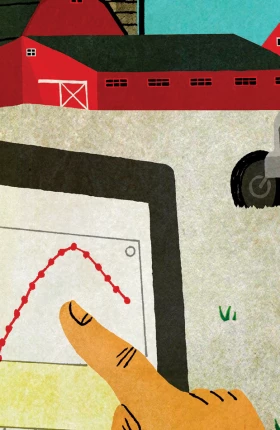Imagine a farmer who, rather than relying on his gut instincts, lets farm management software apply smart algorithms and a large pool of field data to make the daily decisions on how to work his fields. Instead of sitting on equipment outdoors, he and a handful of associates operate all the equipment for a farm covering thousands of hectares from a control room. GPS-guided autonomous drones constantly provide the data required for the algorithms, and other GPS-guided equipment works the fields with precision, sometimes even at the level of the individual plant. The crops have been genetically engineered to resist most fungi, viruses, and insects and are highly efficient in their uptake and use of nutrients. As a result, the farm needs less fertilizer, water, and crop protection than it did in the past.
This scenario may sound like a vision of farming’s future, but most of the individual elements are already available today to early adopters—and not just at very large farms in the U.S., Latin America, and Russia. In Germany, for example, groups of farmers have “virtually consolidated” their small plots by working across field boundaries using GPS-guided equipment and a smart data-driven approach. This technology allows them to precisely allocate yields to each of the group’s members, who realize the synergies and benefits of scale enjoyed by large farms without having to unify ownership of their plots.
We expect the adoption of smart systems that integrate big data and analytics software, wireless connectivity, advanced equipment, and even molecular biology to increase dramatically through 2030. By integrating inputs, farmers will gain better control over them, thereby driving a step change in productivity and yields and altering agricultural value pools and business models.
To thrive in this new environment, businesses providing equipment and inputs to farmers, as well as nontraditional players like providers of digital services, should take action now to adapt their strategies and capabilities and prepare for the changing landscape.
To help companies tackle this challenge, The Boston Consulting Group has explored the key trends that will reshape agriculture during the next 15 to 20 years. Our research included an analysis of all agricultural patents registered worldwide from 2010 through 2014 and interviews with a panel of European farmers, as well as with selected industry experts. Although our research focused on Europe, the strategic implications are applicable globally. Companies can apply our findings to develop the strategies and capabilities that will allow them to harvest value from emerging business models in agriculture.









